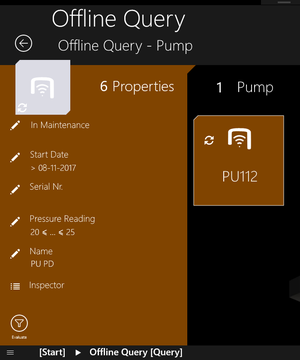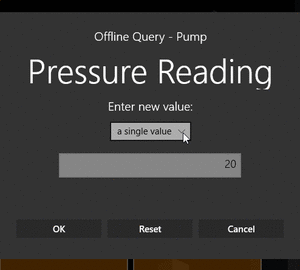Compared to online / server side queries, offline queries provide a similar capability to query for objects that match the criteria defined by the query objects. The major differences are:
- The querying happens entirely offline without the need of networks;
- Only local objects can be found as query results (for obvious reasons).
Offline query page
An offline query page looks similar to a regular content page which shows the properties on the left side and the content objects on the right. The unique characteristics of a query page are:
- The properties on the left serve as query criteria;
- The content objects on the right are the evaluated results of the query;
- There is an additional Evaluate button in the bottom-left corner;
Users can change the query criteria by editing the property values. A press on the Evaluate button then will re-evaluate the query and show the results on the right side.
Offline query criteria
An offline query criterion is essentially a property on the query object. When evaluating a query, every criterion/property is checked against all result candidates (See technical background). A candidate is a match if
- it has all the same properties as the offline query;
- and the values of these properties indicate they are relevant according to the query criteria. (Some types have different ways to interpret what makes a value relevant. See below.)
Several types of criteria are supported on offline queries.
| Boolean | String | Integer | Double | DateTime | Guid | |
|---|---|---|---|---|---|---|
| Single Value | ✓ | ✓ | ✓ | ✓ | ✓ | ✓ |
| Value Range | ✓ | ✓ | ✓ |
Single value criterion
For most single value criteria, UBIK® considers a candidate as a match if the value of the target property equals the value specified in the criterion.
String criterion
For string criteria, instead of checking for the equality, UBIK® does the following.
- Split the string value defined in a criterion by spaces (
- As long as at least one of the sub strings is a part of the string value of the target property, the candidate is a match.
For example, candidate objects with names PU112 and PD2115 are both considered as matches under a name criterion with the value PU PD.
Value range criterion
For types such as numbers or dates, it is sometimes more comfortable to specify ranges for criteria.
- Example 1: Candidate objects with pressure readings
20and25are both considered as matches under a pressure reading criterion with the value20 ⩽ ... ⩽ 25. - Example 2: Candidate objects with start dates
09-11-2017and08-12-2017are both considered as matches under a start date criterion with the value> 08-11-2017.
Currently, the following ranges are supported.
- exclusive between (... < value < ...);
- exclusive greater than (value > ...);
- exclusive less than (value < ...);
- inclusive between (... ⩽ value ⩽ ...);
- inclusive greater than (value ⩾ ...);
- inclusive less than (value ⩽ ...).
Technical background
As mentioned earlier, all offline query criteria are checked against the result candidates. The "METACLASS_IDS" property of the query object determines which objects are the candidates.


